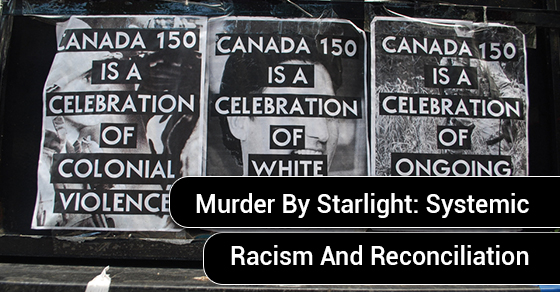Murder by Starlight: Systemic Racism and Reconciliation

The finding of Neil Stonechild on November 29, 1990, in a remote area on the outskirts of Saskatoon with one shoe was a triggering event leading to the revelation of the Starlight Tours.
There is nothing about “The Starlight Tours” that seems to live up to the calming undertone of the name. Despite it sounding like a calm, beautiful night under the stars, the reality of it is better characterized as horrific. The Starlight Tours was a practice by the Saskatoon police in which intoxicated citizens were picked up by the police officers, driven out to the middle of nowhere, and dropped off in attire that would make the average empathetic person extremely worried for the chances of the individual reaching shelter safely before freezing to death. About three indigenous people may have died as a result of the Saskatoon police engaging in these “Starlight Tours”. Worse, this practice may have been going on for years without being brought into the public eye.
The odd occurrences of indigenous men being found frozen in the middle of nowhere on extremely cold nights stirred up questions as to what was happening and why. The series of events that led to the eventual finding of a novel and explicit form of police brutality is alarming. While we like to think that the marginalization, colonization, and explicit forms of racism no longer exist institutionally, that is not the reality. The Starlight Tours is an explicit example of this.
Historically, flawed arguments in science and other fields were used to support colonial agendas that procured benefits to the colonizers. While we like to strongly believe that Canada is beyond this and as a nation we truly are at a point of reconciliation, the recent dehumanizing practice of the Starlight Tour reminds us of colonial legacies.
Police oppression against marginalized groups has been an ongoing issue in Canadian society. 76% of the population in Canada is white, and 4% is indigenous. When looking at this statistic in relation to the diversity of the police force, 92% of officers are white while only 8% of officers consist of visible minorities including indigenous police officers. The disparity in the number of police officers who are visible minorities, in comparison to the population is striking (Statistics Canada, Police Resources in Canada 2017, Patricia Conor).
When we further look at prison rates, in 2015/2016, Aboriginal adults were overrepresented in admission to correctional services. They accounted for 26% of admissions while only representing 3% of the Canadian adult population (Adult Correctional Statistics in Canada, 2015/2016, Julie Reitano).
Such disparate statistics can be explained by intergenerational trauma and systemic racism. Intergenerational trauma is the negative impact of the trauma that is felt by an individual due to the historical oppression and marginalization their people have experienced across generations. Intergenerational trauma is characteristic of the experiences that indigenous people have faced in Canadian society, both historically and contemporarily. Systemic racism is the imposing of dominant cultural values and norms. Systemic racism operates from shared patterns of behavior, unconscious values, assumptions and norms. These values become a part of the psyche of the individual and its effect can be identified when using a critical race perspective. The Starlight Tours is an example of systemic racism in the police profession as well as an explicit form of police brutality.
Strides to reconciliation with the indigenous community by the legal field require legal professionals to pay attention to perspective, circumstance, power, and vulnerability. “Whiteness” continues to permeate Canada’s values and the criminal justice system. Whiteness allows for certain citizens to exercise their powers of not being a ‘visible minority’ while others are victims of police over-reaction. The Starlight Tours is a rude awakening of the racism embedded in the police profession. The realization that systemic racism is embedded in society, and being able to understand the generational impact it has had on varying communities, creates avenues for legal professionals to deal with systemic racism in a proactive manner.

